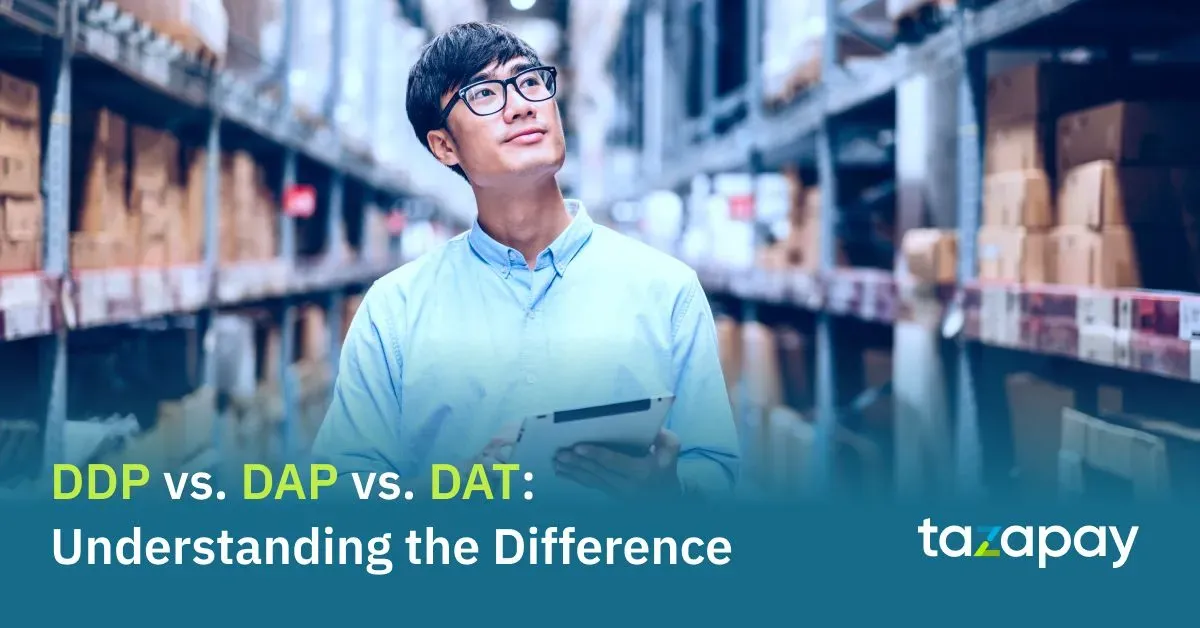- Home
Blog Blog
Customs & Incoterms Customs & Incoterms
DDP vs. DAP vs. DAT: Understanding the Difference
DDP vs. DAP vs. DAT: Understanding the Difference

Incoterms basically indicate the point from where you are held responsible for taking certain risks and the costs involved. Additionally, it can also affect the incoterms you have negotiated with your supplier as well as the expertise that are needed by you to understand the definite processes involved in importing your goods.
DAP - What does it stand for when it comes to shipping logistics?
As far as shipping logistics are concerned, DAP is an international trade term and an acronym for Delivered at Place. It describes a sort of arrangement between the seller and the buyer, on the basis of which the seller bears the costs of moving sold goods from one place to another. It also includes the following -
- Packaging
- Loading bills
- Documentation
- Insurance
- Complete delivery and transport to a pre-decided location
When it comes to a DAP agreement, if in any circumstance, there is financial losses for the seller, the seller accepts those as well. The buyer, in such a case, is not liable for the seller’s losses. Similar to DDP and DAT shipping terms, any type of transportation is applicable under a DAP agreement, as deemed fit for the job. In addition to this, the contract also mentions the exact point starting where the buyer takes on complete financial responsibility. For instance, if the delivered at place location is a port in Mumbai, the buyer’s financial responsibility begins right there.
Once the goods are delivered to the specified location, the responsibility of unloading the goods and sending them ahead for import falls upon the buyer. When it comes to DAP, it is the buyer’s responsibility to pay for import duties as well as any other form of clearance or taxes.
How is DAT different from DAP & DDP?
A relatively new Incoterm, DAT, is used to indicate the distinct procedures of shipping products. The acronym DAT stands for Delivered at Terminal. Although the costs associated are pretty much similar to that of Delivered at place and Delivered Duty Paid, there are some minute differences as listed below -
1) When it comes to DAT, the sole authority of handling and managing imported goods rests with the seller only, until the time the goods are unloaded at the terminal.
2) As far as DAT Incoterms is concerned, it is the buyer and not the seller who’s held responsible for the final unloading of all goods and products. In a DAT arrangement, it is the buyer who covers the cost of paying import duty, taxes as well as any other customs costs.
DDP vs. DAP - What’s the difference?
If we look at Delivered Duty Paid or DDP incoterms meaning, it is pretty much similar to DAP, one thing that sets them apart is that when it comes to DDP, most of the responsibility including the menaces and the costs, falls solely upon the seller - right from the beginning until the end. Similar to DAP, the seller in the DDP agreement takes up all the duties and costs associated with the process of delivering the products to a particular location. In DDP, it is solely the seller who bears all the prices associated with clearance, and not the buyer. Additionally, when it comes to DDP, it is only the buyer who is in charge of properly unpacking everything at the specified location.
Additionally, when you make payments via trusted platforms like Omoney, your money is securely handled and regulated by the Monetary Authority of Singapore (MAS), Rapyd. As per MAS requirements, when you choose Omoney, all customer funds are safeguarded and stored with an authorised bank in Singapore.
Are you confused about which shipping term to use when there are no customs between the country from where the goods are being shipped and the country where the products are reaching? Well, in such a case, it is not necessary to clear goods for import. And it’s best to use DAP shipping terms. However, if the seller is not able to carry out import clearance, or when there’s a lack of resources, DAP shipping terms must be used.
It is only when you understand the differences between DAT, DDP, and DAP incoterms that you can properly and accurately estimate your shipping costs because it’s likely that it will also affect your shipping costs. Knowing and understanding these differences can also prepare you to conduct an undisturbed operation.
Category

Customs & Incoterms
DDP vs. DAP vs. DAT: Understanding the Difference
Related Articles

DDP vs. DAP vs. DAT: Understanding the Difference

2010 vs. 2020: What Has Changed in Incoterms






